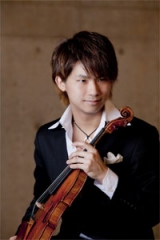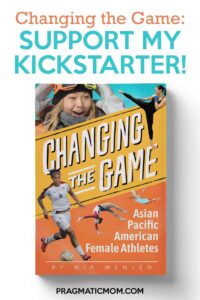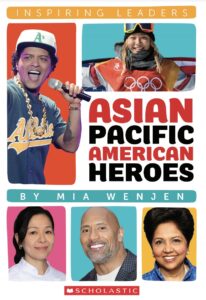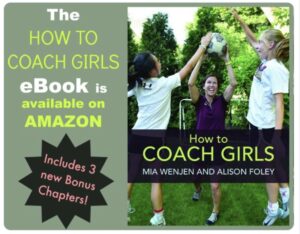 A lot of Mom and Dad friends sent me the link to the Wall Street Journal article and video so I am going to attempt to speak for my “kind.”
A lot of Mom and Dad friends sent me the link to the Wall Street Journal article and video so I am going to attempt to speak for my “kind.”
First of all, I can totally relate to this article. My father was from mainland China and came over before the Communist takeover. He scored crazy high on standardized tests in China which allowed him to attend the best Chinese University and become a math professor. He then fudged his age and came to the U. S. to study for his Ph.D. at U.C.L.A. on a government-funded scholarship.
But here’s where he took a crazy left turn: he married my mother who is JAPANESE!
So, I was raised along with my older brother and younger sister, very Asian but half Japanese and half Chinese. This is a very usual mix back in the day because the Chinese hate the Japanese (bad blood due to raping and pillaging). What’s more, I married a Korean national. Do two lefts make a right? (And, to be fair, my husband is technically a Korean national but he came over at a young age and could not be more Americanized! He was the captain of his high school soccer and golf team, for god’s sake!).
And yet, I chuckle, albeit a bit painfully, as I read the list of the author’s never allowed to do’s in the article, with my list next to hers:
- attend a sleepover: CHECK. Nope, never allowed to do that. My dad thought we’d get raped.
- have a play date: We were allowed to have play dates as long as our grades were perfect.
- be in a school play: Not an issue because I did not want to do this EVER!
- complain about not being in a school play: NOPE, we were vociferous complainers.
- watch TV or play computer games: 1 hour of screen time a day, somewhat strictly enforced.
- choose their own extracurricular activities: NO, my parents were older and worn down; however they could not afford to pay for many extracurriculars.
- get any grade less than an A: CHECK. We were expected to pull in straight A’s. However, we could get out of anything we didn’t want to do by claiming the need to study. That included chores, family dinner parties, etc. A useful bargaining chip!
- not be the No. 1 student in every subject except gym and drama: We didn’t have drama class requirements but we were expected to get A’s in all classes including home economics, metal shop, and gym. The idea here was effort: put forth the effort to get the A grade.
- play any instrument other than the piano or violin: In fact, I played violin and my sister played piano. My brother played the trumpet very badly. I wasn’t that good at violin but younger sister was very good a piano and now is a piano teacher.
- not play the piano or violin. We were allowed to quit if we complained enough but private lessons were a luxury.
The reason why Chinese (and Asian for that matter) parents did not encourage drama for their children is that NO MATTER HOW HARD YOU, THEIR CHILD, WORKED AT IT, WE WERE NEVER GOING TO SUCCEED. When I was a kid during the ’70s and ’80s there were NEVER any Asians on TV. They were not in commercials. They were not on TV shows. If my parents ever saw an Asian on TV, they would comment on it because it was so unusual. There was Connie Chung, the newscaster. There was once a SitCom that portrayed Asians in a stereotypical way. My parents weren’t offended and we watched it, but it didn’t last more than a few episodes.
Asians value education and hard work because it’s a formula that works. It worked in the old country, especially in China where high-paying government jobs were awarded based on test scores. Thousands of years of Confucian thinking also have ingrained a cultural mindset of filial piety, education, and hard work. And this is why the formula works: Due to limited resources, your parents sacrifice everything for you, therefore they are not set up for retirement. You are their retirement plan. If you don’t succeed, they are sh*t out of luck. That ain’t good for nobody! Thus the pressure to succeed because your success enables the entire family to rise above their current standard of living.
When Asians came to the U.S. as immigrants, they stuck to this formula and steered their kids towards professions that were less subjective therefore less prone to prejudice: doctors, scientists, and engineers. If you were too squeamish at the sight of blood, your parent would mentally cross of the doctor and switch it to engineer. It’s not that Asians do not support careers in the Arts or appreciate the Arts — they love classical violin and piano — but NOT AS A PROFESSION. They don’t think their children would be able to succeed in the Arts, particularly as actors.
This was my cultural reality and the reality of most Asian kids that I knew, but there’s a flip side to everything. Are Chinese Mothers Superior? That is a mighty aggressive headline, first of all. Very un-Asian-like. This extreme style of parenting correlates to 1) standard of living for parents (lower = stricter), 2) recency of immigration (more recent = stricter), 3) stay at home parent vs 2 working parent (stay at home = stricter), and 4) insanity of parents (more insane = stricter).
I would hazard to say that Asian parenting is different not superior. (But maybe that my half-Japanese side coming out. The Japanese value harmonious relations. And compared to the Chinese, they don’t brag about their kids. It’s considered bad form.) But some things are universal truths and realities for Asian children:
- filial piety including respect for elders and an obligation to take care of parents
- education is the path to success and is measured by grades and test scores
- practice makes perfect whether this is applied to sports, music, or academics
- parental sacrifice to make sure children live a better life … particularly for new immigrants
- your personal preferences not taken into account (note how big arranged marriages were in the old country!)
- the difference between success and failure is effort (and failure is not an option)
But is this idea of hard work and emphasis on education so different from other new immigrants from other countries? I would say no. Really. And, as the Chinese and other Asians settle in, successive generations soften this hard line of parenting. I am a good example. 3rd generation on my mother’s side, 2nd generation on my father’s side, I am a slacker Asian parent compared to any Asian parent I know, particularly a recent immigrant. The reality is that when you come over, there’s no safety net but as each generation succeeds, it paves the way for the next to take greater risks including … an acting career!
In conclusion, here’s an interesting older post of mine that shows the grass is always greener. The newest hottest parenting book in China is about listening to your child which is much more similar to parenting in America! Read the post here. It’s another article from the Wall Street Journal.
Also, you might like Gifted Children Just as Likely to Fail. In this article, extreme “pressure” parenting backfires if children are not allowed to develop social skills (because they are studying and practicing so much!)
For the article, Wall Street Journal Article: Why Chinese Mothers Are Superior
For the video, Video follow up on WSJ article.
Here’s my second post on this topic: Why Chinese Mothers Are Superior (!or?) WSJ, Take2
What is your reaction to this article? Please leave a comment!
p.s. The image is of Fumiaki Miura, the First Prize Winner of the Hannover International Violin-Competition 2009. For a violin child prodigy, not so nerdy, huh?!
p.p.s. My flute teacher showed me this article and her high school student was there for her lesson. She’s Asian and, I believe, Chinese. The students take, “The article is crazy. My parents aren’t this way … but it’s true when I got a 95% once, they asked why wasn’t it a 100%?” And this student is ranked as the number 1 flute player in the state. Coincidence?!
To examine any of the items listed, please click on image of item. As an Amazon Associate, I earn from qualifying purchases.
BEST #OWNVOICES CHILDREN’S BOOKS: My Favorite Diversity Books for Kids Ages 1-12 is a book that I created to highlight books written by authors who share the same marginalized identity as the characters in their books.










Loved reading your thoughts! I just blogged about this article and I came away with many of the same points as you. I agreed with much the author had to say, although I couldn’t stomach the name calling and put downs.
I would be interested in knowing how children of “Chinese mothers” who parent as described in the article feel about the pressure placed upon them or is that just me thinking like a Westerner, lol.
To Carletta,
Children of Chinese Mothers, I suspect, will differ in opinion depending how extreme their parent was. What shocks me was that Amy Chua drank the Koolaid of her extreme upbringing and then tried to implement to her children. Does she not have a shred of rebellion inside her? That’s the strangest thing to me… I’m sure she had the same objections to the same things her kids had to her when she was kid? Otherwise, that is freakish to me!
Mia, I am so thankful that you responded. I appreciate your thoughts. I find it so interesting because I was talking with my West Indian friend lastnight and her cultural take on this issue is very similiar. Education to them is everything. Her parents both left the West Indies and went to London, where they both were educated one a nurse the other an engineer. What I find so sad about this is that as an African American who is a descendant of slaves, at what point did we loose this idea that we must pursue our education so that we can live better, or did we ever have it. This art is lost in our culture. Sure that is a percentage that place your ability to be successful on your education but as I talked to my other friends who happen to be african american some of them were never told to study. It makes me wonder why this is, I was always told that if you wanted to be anything you had to have a good education and take risks. This is so interesting to me, and of course I have opened up a whole can of worms with my mother. LOL
To Charlotte,
I suspect that the roots lie in slavery when the family units were broken up and dispersed and this was exacerbated by a Jim Crow system that pretty much killed the feeling of Can Do optimism that most immigrants have when they arrive in this country. I think education is a day-to-day battle done in the kitchen over daily homework and test prep. This is harder to execute in single parent households. You really need two adults on deck to accomplish this day in and day out.
I have no data, but I suspect single parent households of any ethnicity have a greater challenge getting their kids to value and excel at school. What do you think?
Hello Mia! I did catch that interview yesterday on the Today show and believe it or not I thought of you (in a good way!). While I didn’t agree with that mom’s exact methods (specifically the belittling) for raising her children, I wasn’t in total disagreement either. I am not Asian, I’m 1st generation Latin (parents are from Costa Rica) and interestingly enough, I was raised in a somewhat similar environment at least for most of the earlier years of my life. At that time we lived with my grandparents and they were old school and very strict. I adored them. Around 4th or 5th grade my grandparents moved from NY to South Florida and we stayed in NY. Both of my parents needed to work and worked long hours. Looking back I can remember them coming home late and exhausted and slowly the bars and rules that were originally set for me began to slowly come down. They tried to continue to implement the rules and regs and I did try to stay the course but at that point I was the oldest of three and pretty much raising my younger siblings and I can still vividly feel the imbalance. To this day, there is still a lot of regret because I sincerely believe I was capable of doing so much more. While I did start college, I didn’t finish because at the time I had an opportunity to help open up a small business in telecommunications. And although it was a ton of work, I learned so much about business and people. At that time I did feel like I was growing and learning and became more confident. My salary during that time was unheard of for someone my age and I felt I didn’t need a degree While I did not have an college official degree, I did develop a strong skill set and had significant experience. But as that business changed and I had to move on, I immediately experienced the impact of my immature decision and it’s something I’ve let hold me back for many many years. To this day I still struggle with the decision to actually enroll myself and attain a degree but it’s more a personal accomplishment. Anyhow, I know have a 16 year old daughter and 6 year old son and while I try to hold the bar up, my daughter has learning difficulties and just keeping her confident while she struggles at school has been a challenge. Her difficulties have also given me awareness to the sense of entitlement and take for granted attitude that largely makes up our society today.
My point finally is that looking back I wish my parent’s had held that bar up for me and I regret not holding it up for myself. In my opinion, today’s generation is extremely spoiled and for most, working hard to achieve something is an inconvenience. And I watch them and feel so sad that they weren’t consistently taught how to fight to reach and surpass that imaginary bar. I think incorporating a lot of those cultural expectations would do wonders for this country.
Thanks again,
Sylv
To Sylvia,
Thank you for sharing your experiences! It’s a hard call to make of how high to set the bar and it’s completely exhausting to enforce it. I know that I have to choose my own battles with my children carefully because I just don’t have that kind of energy or fortitude. At the end of the day though, you sound like you’ve lived life and pushed yourself and I think that is really the point of setting the bar high…it’s to get our children to internalize high expectations of themselves and not be satisfied with what is easy or what is mediocre. You sound like a great role model to your children!
I thought of you when I saw the article a few days ago as well. Your mom is hilarious and although there are many traits that you describe, I recall a certain mother not like another Chinese mother due to bragging about her children. I also recall you pushing me to play solos in flute class and pestering patients to eat their bad hospital food. Apparently your training has served you well.
To Sherry,
I just love getting back handed compliments … and seem to get so many these days. hmmm… what does that mean exactly? [Note to readers, Sherry is one of my best friends from childhood; age 13 to be exact!]. We used to volunteer at the local hospital (ah, those pre-med aspirations!) and our job was to deliver flowers and feed patients who couldn’t feed themselves. I used to cheerfully force feed my charge their pureed food.
And yep, my mom is Japanese, but the Chinese husband must have rubbed off on her because she does tend to brag on and on about her kids and grandkids! Ah well, what can you do?!
I think this is a great post. I was quite interested in the original article – although I found Chua quite harsh and mean-sounding, I know that interviews can be edited to make things sound a bit more extreme. I found some of her quotes quite harsh, but I also think that she makes some very valid points. I am not Asian, but I grew up with parents who did not accept me not getting A’s. I had to be #1. I practiced piano 3 hours a day. But, a lot of it had to do with me. I was an anxious child and wanted only to be #1, and my parents really encouraged that. I’m not unhappy that they did.
To Nicole,
Thank you so much for your comment! One thing is clear from that article: “Chinese” Parenting is not limited to the ethnic Chinese! I’m glad that in your case, it was your own goals that drove you and I think that makes all the difference. I also do think, in retrospect but also NOT having read Amy Chua’s book, that the article took her words out of context. But, hey! Great PR for her book. I hear it’s reached #7 on Amazon. The death threat part is bad, but they do say that all PR is good PR!?
Here’s a parody of this article entitled, “Why American Parents Are Inferior.” Enjoy!
http://playborhood.com/site/article/why_american_parents_are_inferior/
To Mike,
Thank you for the link. The parody is actually a great point of view about the right of kids to pursue happiness as they, not the parents, define it and to appreciate the journey. Great stuff and nicely done. Thank you!
I enjoyed both Chua’s article and this posting. My parents were immigrants and demanded a high level of obediance, but now that I’m a parent, I see why — if your parents aren’t the boss, they can’t protect you, can’t help you, can’t guide you. I know my non-immigrant in-laws thought I was too strict with my children when they were toddlers, but now that they see that makes THEIR job easier when they care for them, they’re true believers.
One thing I think many readers don’t realized — yes, Chua’s headline was provacative, she didn’t write, a WSJ editor came up with it. And the situation she described with her daughter and the musical piece was outrageous, but funny b/c even though my chilren are young, I’ve gone to some crazy extremes/threats to get them to eat, to try a new tooth-paste, of all things. (That was a week-long, tear-stained ordeal and all I know was that I. WAS. NOT. GOING. TO. LOSE. It would have looked crazy to an outsider, but in the end, she used the new toothpaste and learned an important lesson — that she’s not in charge. I am.
To Brenda
There is something to be said for asserting dominance the way you must for your dog in order to be the pack leader. As the parent, yes, the parent should be the pack leader, but good leaders also gauge and promote the best interests of their followers. For this to work, there has to be balance with the burden on the pack leader/parent to make sure his or her followers/children’s point of view are considered.
But yes, certain things are non negotiable like safety issues. But where and how do you draw the line?